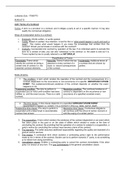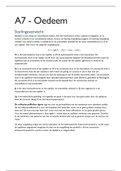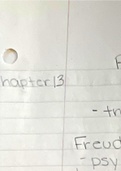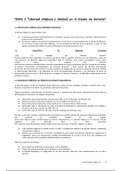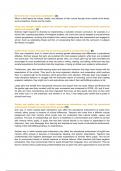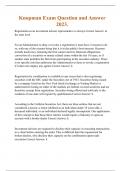BUSL6212
LU8: Terms of a Contract
Terms: A term is a provision in a contract, and it obliges a party to act in a specific manner. It may also
qualify the contractual obligation.
Ways of incorporation terms in a contract:
Expressly: Words written, or words spoken
Tacitly: Based on parties’ true intention. A test for this is ‘what would happen in such and such a
case?’. This means what would happen if you knew the knowledge that omitted from the
contract? Would you terminate or continue with the contract?
Impliedly: Incorporated into contract by operation of the law. If an individual wants to exclude this
term for a contact of sale, you can add ‘voetstoots’ to the contract i.e. the asset is sola as it is.
Terms implied by law is usually referred to as NATURALIA.
Classification of Terms
Essentialia: Terms which Naturalia: Terms if which the law Incidentalia: Additional terms of
identify the contract as being a attaches to every contract of a a contract that are chosen by
certain kind of contract i.e. the class i.e. natural consequences parties.
essential contract elements. of the contract
Kinds of terms:
1. The condition: A term which renders the operation of the contract and the consequences of a
contract dependent on the occurrence or non-occurrence of a specific UNCERTAIN FUTURE
EVENT. The existence/continued existence of the contract depends on whether the event
happens or not.
Suspensive condition: The duty to perform is Resolutive condition: The continued existence of
suspended (put on hold) until condition has been contract is dependent on the occurrence or non-
fulfilled i.e. until the event occurs. There is a valid occurrence of a specified uncertain event.
contract.
2. The time clause: A time clause depends on a specified CERTAIN FUTURE EVENT
(guaranteed to happen i.e. certain). It is a moment in time e.g. dates, period, death.
Suspensive time clause: The duty to perform is Resolutive time clause: Contractual obligations
suspended until a determined or ascertainable will continue until the arrival of certain moment or
moment has arrived. until the expiry of a certain period.
3. The supposition: A term which renders the existence of the contract dependent on an event which
has taken place in the past or on the state of affairs which existed or exists at the time of
concluding the contract. By providing that the operation of a contract is subject to a supposition, a
party’s motive for concluding the contract may become a term of the contract.
4. The warranty: The seller assumes additional responsibility regarding the quality and standard of a
product and/or services.
5. The modus: A contractual term which burdens a contracting party’s right to the performance
made to him in terms of the contract. Burden can be to perform towards 3 rd party, to do something
or to refrain from doing something.
6. Cancellation clause: Entitles a contracting party to cancel the contract immediately if the other
party if in breach of any form. The Lex Commissoria is the general cancellation clause.
1
, 7. Penalty clause:
Is a remedy that is incorporated by the parties themselves
Obligation imposed by penalty clause usually consists of the payment of a sum of money
Penalty clause is governed (regulated) by he Conventional Penalties Act 15 of 1962
The act prohibits person from claiming damages as well as stipulated penalties – must
claim one or the other.
Act allows parties to stipulate in contract that party will have choice between claiming
penalty and damages.
THE NATIONAL CREDIT ACT AND PENALTY CLAUSES:
National Credit Act also governs the enforceability of penalty clauses
A distinction is drawn between 3 types of contracts:
I. Those contracts which are governed by the National Credit Act (NCA) and the Conventional
Penalties Act
II. Those contracts which are governed by the Conventional Penalties Act (CPA) only
III. Those contracts which are governed by neither the NCA nor the CPA i.e. the common law.
Where contract is governed by both NCA and CPA – there could be conflict between the
provisions of the 2 Acts – NCR provides that in case of conflict of 2 Acts – provisions of NCR will
prevail
Re scenario 2 = validity of penalty clause is determined by provisions of CPA
Re scenario 3 = validity of penalty clause is determined by common law
8. Forfeiture clause: It makes provision for a party who is in breach to lose the right to restitution.
9. Rouwgeld (Rouwkoop) clause: A rouwgeld clause is NOT connected to a breach of contract. It’s a
term which allows a party to contract to withdraw from contract upon payment of a certain sum of
money. When clause relates to sale its called ROUWKOOP.
10. Enrichment clause: Term which provide that contact may only be altered by means of a written
amendment.
Parties to the contract – Where more than 2 parties conclude a contract, their involvement in sharing its
rights and duties must be determined:
A. Simple joint liability or entitlement: Each debtor is liable for his proportionate share of the
performance, which is presumed to be equal i.e. if there is a debt of R5000 which needs to be
paid to a creditor and there are 5 debtors = they would each need to pay R1000.
B. Joint and several liability or entitlement:
Each debtor is liable for full amount of debt
Creditor elect who and how to recover against
Full payment by one co-debtor discharges debt
Debtor that discharged debt has right of recourse to recover from co-debtor.
Luthando Zulu -17599770
BUSL6212
2

